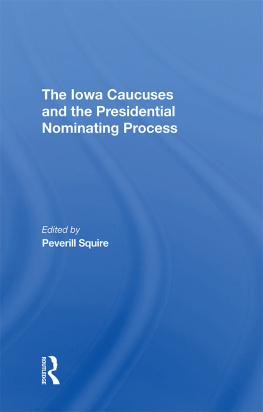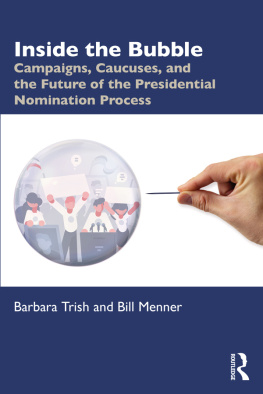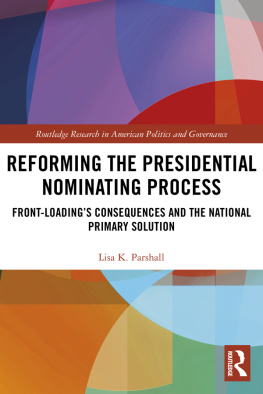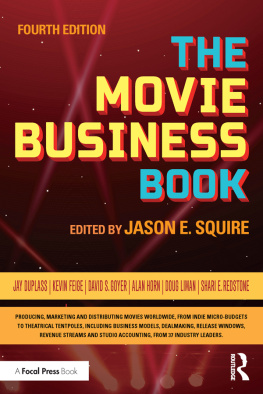First published 1989 by Westview Press
Published 2019 by Routledge
52 Vanderbilt Avenue, New York, NY 10017
2 Park Square, Milton Park, Abingdon, Oxon OX14 4RN
Routledge is an imprint of the Taylor & Francis Group, an informa business
Copyright 1989 Taylor & Francis except for Chapter 6, which is Nelson W. Polsby
All rights reserved. No part of this book may be reprinted or reproduced or utilised in any form or by any electronic, mechanical, or other means, now known or hereafter invented, including photocopying and recording, or in any information storage or retrieval system, without permission in writing from the publishers.
Notice:
Product or corporate names may be trademarks or registered trademarks, and are used only for identification and explanation without intent to infringe.
Library of Congress Cataloging-in-Publication Data
The Iowa caucuses and the presidential nominating process/edited by
Peverill Squire.
p. cm. (Westview special studies in American government
and politics)
Includes bibliographical references.
ISBN 0-8133-7712-9
1. PrimariesIowa. 2. PresidentsUnited StatesNomination.
I. Squire, Peverill. II. Series.
JK2075.182I69 1989
324.5'2dc20 89-33755
CIP
ISBN 13: 978-0-367-29323-9 (hbk)
For my favorite native Iowans, L. E. Peverill and Russell A. Squire
The strength of any edited book lies in its contributors. The intent of this volume was to better explain the Iowa caucuses, both as a single event and as an important component in a larger system. Whatever success is achieved in meeting this goal is due to the scholars whose work appears within. The comments of Richard F. Fenno, Jr., and Marie-France Toinet helped hone the chapters. I thank Joel Barkan, who as chairman of the University of Iowa's Department of Political Science encouraged me to use money from the department's Benjamin F. Shambaugh fund for this volume, and his successor, Douglas Madsen, for help in putting it together. Karen Stewart handled the paperwork details with her usual expertise.
The first six chapters presented here are updated versions of the papers presented at a Shambaugh conference, "First in the Nation: Iowa and the Nomination Process," held at the University of Iowa, February 7-8, 1988. The last two chapters were added when their authors generously consented to extend their comments on the original papers.
On a personal note, I would like to dedicate this book to my favorite native Iowans: my grandfather, L. E. Peverill, and my son, Russell A. Squire. I hope I can give to the latter the love of politics that I gained from the former.
Peverill Squire
1
Iowa and the Nomination Process
Peverill Squire
Since Iowa's admission to the Union in 1846 the state's political parties have, with one exception, employed a caucus system to select delegates to the national convention. But, what was once a contest of only marginal interest to the presidential candidates and the national media has, in recent years, become a major event in the nomination process. How has a state which in most other regards has become progressively less influential in national politics become so prominent in the single most important nationwide election?
In this chapter I examine the Iowa caucuses. First I discuss how the caucuses went from obscurity to fame, and document their importance by examining media coverage of them. The discussion then shifts to the effect the importance of the caucuses has on the behavior of candidates. The final topic addressed is the role of the caucuses in the nomination process; whether it is a function that should or should not be given to Iowa.
How Iowa Became First in the Nation
Iowa's "first in the nation" position did not result from skillful manipulation by its political leaders but as the unanticipated consequence of a series of unrelated decisions by the parties and the state legislature. A 1969 state law required that both parties hold their caucuses before the second Monday in May, which posed no problem because in previous years the parties had been holding them in March or April. The decision by the state Democratic party to move its 1972 caucus to late January was prompted by the early July 9 date set by the Democratic National Committee for the start of the national convention. The rules governing the Iowa Democratic party required 30 days between official party meetings-precinct caucuses, county conventions, congressional district
practical reasons; party workers needed that time to process paper work in preparation for the next function.
The increased importance enjoyed by the Democratic caucuses which the shift to the beginning of the 1972 campaign calendarbefore even the New Hampshire primaryproduced came mainly from hindsight. The Democratic state party chairman at the time, Clif Larson, recalls (Lehr, 1988, p. 12), "We didn't realize it at first, but we figured it out ... But even then we didn't anticipate the attention we got." The caucuses that year did receive some national media coverage and visits from the candidates which they had not gotten before. But the actual amount of attention was slight; McGovern, for example, was in the state only a day and a half (Cook, 1987, p. 8) before his "surprise" showing in the caucu.
The caucus results seem to have become important only in retrospect, when it became necessary to pinpoint the beginning of the McGovern surge.
written following the 1972 campaign (e.g. White, 1973; Crouse, 1973) make no mention of the Iowa caucuses. They were the first event of the election year, and therefore worthy of some attention, but they were not deemed important at the time by most observers.
The small amount of national attention that the caucuses had received was, however, noted by the leadership of the state's parties. The Re publicans had not benefited because they had held their caucuses in April. The two parties saw cooperation to be in their best interests and they reached an agreement to hold their 1976 caucuses on the same dateJanuary 19. The goal was, of course, to keep the caucuses first on the campaign calendar and receive the substantial amount of attention from the media and candidates warranted by that position. The GOP even changed their procedures, instituting a poll of caucus participants, so that they would have "results" to give the media.6 state party chairman at the time, Tom Whitney, claims that his party actively courted attention (Lehr, 1988, p. 13):
We convinced the candidates that the most important place to be was in Iowa because that's where the media was going to be. We convinced the media that if you were going to report the story you. had to be here because the candidates were.
But, while the state parties positioned the caucuses to be more consequential in the nomination process, it was Jimmy Carter's successful drive to the 1976 Democratic nomination that made them important. The astute plan developed by Hamilton Jordan to exploit the changed rules under which the Democratic nomination was contested gave great weight to the results in Iowa. The Carter campaign was banking on extensive national media coverage, therefore they concentrated many of their limited resources in Iowa. When the results of straw polls in Iowa during the fall were given coverage in the New York Times and other national media the Carter strategy was validated (Witcover, 1977, pp. 214-215).











